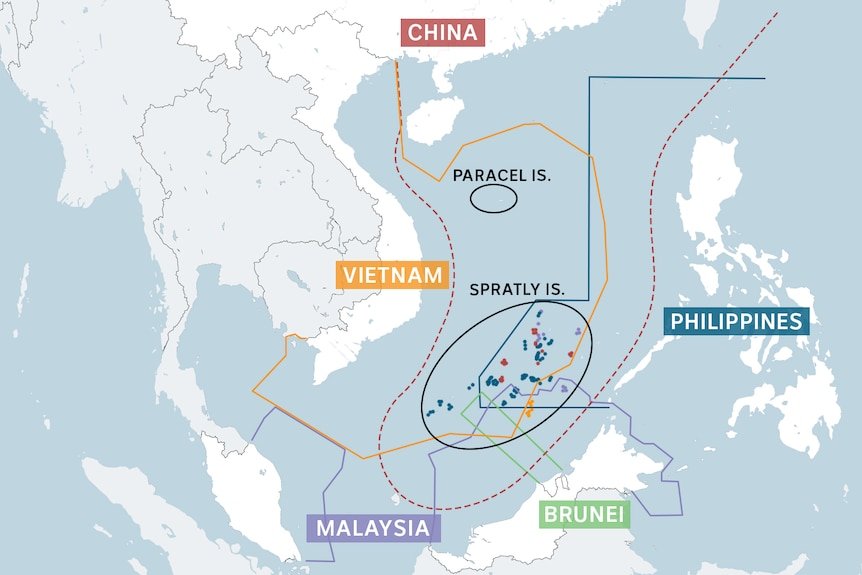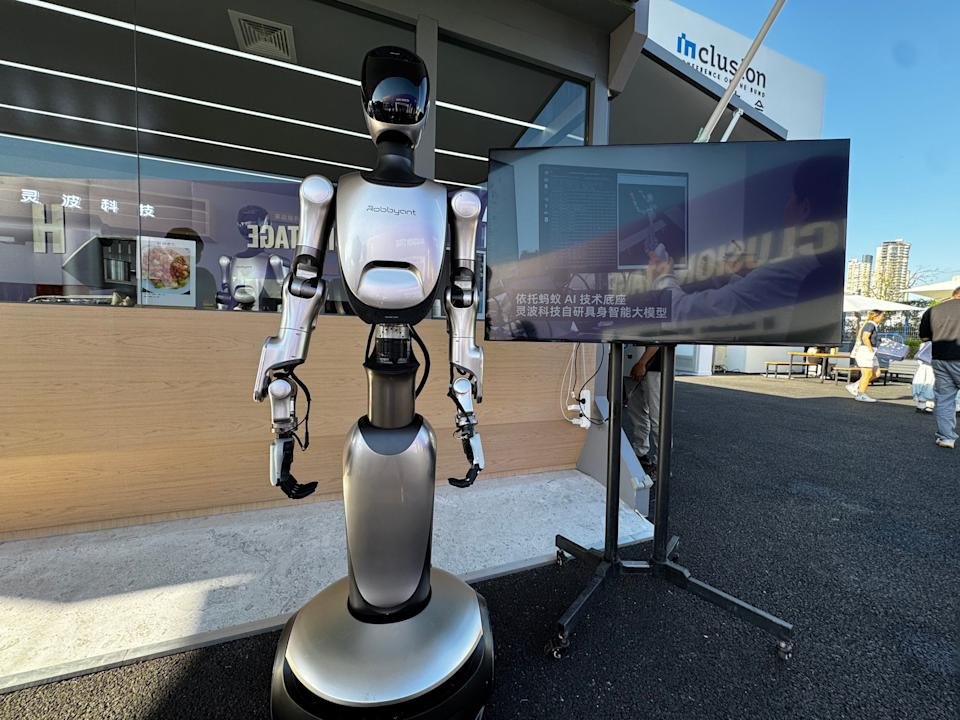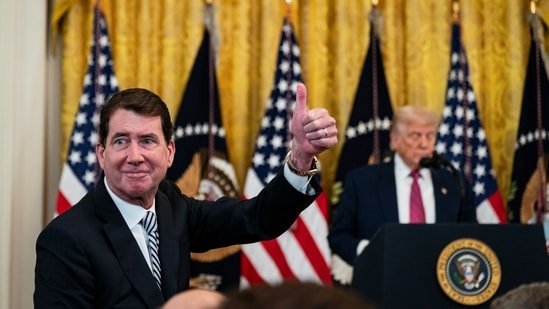
“Where are you from?”
“I was adopted from China.”
Not “I’m Chinese.” Definitely not “I’m American” — my face ruins that one before it starts. I’m adopted from China. That one preposition — “from” — has done more reputation rehab than whatever a Disney Channel alumnus has to go through after being caught snorting cocaine outside of Chili’s.
“From” is strategic. “From” creates space. And for most of my life, that’s what I’ve been trying to do: make people comfortable with how Chinese I wasn’t.
I grew up in the Midwest, an hour outside Detroit, in the suburbs, where small talk meant being asked if I ate dogs. Some showed me grainy videos of animals being yanked off the street, then stared at me like I might chime in with marinade tips for severed paws. I had a dog. My pet. Not my dinner.
In fact, my family dinners featured Domino’s extra-extra-large pizza and the occasional steamed broccoli, if my parents were feeling aspirational and if the microwave wasn’t already in use. But somehow, I was still expected to answer for things I’d never experienced. I became a walking PR firm for a country I didn’t grow up in, forced to do damage control for an entire culture I understood through watching “Mulan” and “Ni Hao, Kai-Lan.”
In high school, I clutched onto my adoption story like it was a VIP pass to whiteness. Don’t worry, I was spiritually raised inside a Costco sample aisle. I ate Kraft mac and cheese, freezer waffles and those weird jello salads with suspended fruit that show up at church potlucks uninvited. I grew up believing chopsticks were decorative and soy sauce came exclusively in packets.
Sometimes, I’d catch myself dropping these “not really Chinese” facts into conversations. During ninth-grade class introductions, the teacher would get to my name — “Butchko?” “Here!” I’d say, adding, “That’s actually Ukrainian. My dad’s Ukrainian.” Even though, technically, it’s my grandparents who were Ukrainian and German. My dad grew up in Ohio, so think less borscht, more ranch dressing and lawn care. The teacher was already calling “Schwartz.”
Deep down, I believed that being less Chinese made me more acceptable. That I could slide under the radar of both white suspicion and Asian scrutiny by waving my Slavic last name around like a get-out-of-stereotypes-free card. Still, I didn’t belong. From elementary school through high school, I hovered in a strange cultural no-man’s-land. I wasn’t “in” with the white kids, but I also didn’t fit with the Chinese students. The ones who had real language skills, tiger parents who treated B+ grades like criminal offenses and weekend Mandarin school enforced like a court summons.
For a long time, I thought this was a “me” problem. That I just wasn’t confident enough or cool enough to claim an identity. Eventually, it hit me: Maybe it’s not just that I didn’t fit in. Maybe it’s that being Asian simply wasn’t cool. But this explanatory gambit failed as well: somewhere between eighth-grade braces and college dorm group chats, the same kids who used to pull their eyes back on the playground were now spending $42 on snail mucin and DMing me TikToks of K-pop idols crying on stage.
The real peak hit in 2020 — the year BTS topped the Billboard charts and the year half the country suddenly formed a parasocial bond with seven Korean men in glitter pants. Koreaboos multiplied overnight. Hanboks sold out on Etsy. My lab partner told me she couldn’t identify as American anymore because her “soul was in Seoul.”
Japan staged its own takeover. Everyone was locked inside watching “Attack on Titan,” “Naruto” and “Demon Slayer,” emotionally devastated by animated swordsmen with backstories more intense than most divorces. Crunchyroll subscriptions became legitimate. No longer just a pop-up ad on a sketchy anime site next to “Hot Singles Over 45 in Your Area” and a malware alert written in Comic Sans.
And then … there was China. Also 2020: the year of a global pandemic allegedly started by a bat with a flair for biohazard-level performance art and an impressively devastating world tour. While Korea was exporting serotonin and synchronized choreography, China was getting prosecuted for airborne death and global supply chain collapse. Talk about a PR nightmare that made my elementary school dinner denials look like amateur hour. And me? I was still undesirable. China didn’t get a rebrand. It didn’t get sexy. China was still the land of mathletes, firewalls and unskippable data-privacy policies.
My freshman year of college, I went on a date with a guy who asked about my family. I casually mentioned that some of my relatives on my mom’s side were ethnically Japanese. His pupils dilated. His voice dropped half an octave.
“Oh my God,” he gushed. “I’ve always wanted to go to Japan. You know, I just really vibe with like … the philosophy of Japan.” He started listing his favorite Studio Ghibli films in order of emotional impact, told me I’d look way hotter in a kimono and referred to Tokyo as his “spiritual home,” even though he’d never been outside of Connecticut. After he paid the bill, I kindly informed him he should try fucking a bonsai tree instead. As much as I also love “Hello Kitty,” this was a very firm goodbye to Kitty.
A few weeks later, I found myself at a Mexican restaurant with a different guy on a different date. Mid-chip-and-salsa, I casually mentioned I was Chinese.
“Oh … that’s nice,” he said, chewing his chicken burrito for a full 23 seconds (I counted). “Actually, I’m thinking about going into, like, international government work. U.S.-China relations. Nuclear weapons sort of thing. Actually … could I, like, practice my Mandarin with you?”
The vibe was less flirtation, more unpaid internship.
The ethnicity hierarchy came into sharper focus when my guy friends would announce how they “love Korean women.” When I asked what that meant, they pulled up what can only be described as a meticulously organized Pinterest board of K-pop idols. Big eyes. Printer Paper skin. Cheeks like artisanal bao buns. Faces so symmetrical they looked 3D-printed by God and FaceTuned by capitalism — as if porcelain dolls and anime stills gained sentience and declared, “This is what desire looks like.”
One of my guy friends squinted at me and asked, “Wait … you’re Chinese though, right?”
“Yeah.”
“Oh.”
Oh.
I wondered, maybe if China had launched a 12-step skincare line and a boy band with jawlines engineered in a lab before it launched mass surveillance, would I have had more high school friends and better boyfriends? Would people have asked about my background with curiosity instead of the tone usually reserved for TSA interviews? Would I have been … dare I say … cool?
If Korean women were limited edition, I was bulk purchase. Not because of anything I did, but because coolness, it turns out, is just cultural marketing. Korea and Japan sold the world what it was ready to worship: unique exports that people obsess over. You can’t dance to Marxist-Leninist statecraft. You can, however, wear glitter eyeliner and cry to a Korean boy singing about heartbreak in a key that only orca whales can hear.
Also, too many things crowd the “Made in China” label — from toys that break before you finish unboxing them to USB gadgets with product descriptions written by an AI trained on Nicolas Cage movie scripts: “NOSE HAIR BLADE DEVICE IS BRING YOU JOYFUL LIFE FOR MANS WITH DELICATE HOLE AREA.” “Made in China” means replaceable. But whisper “K-beauty” and people will hand over their wallets, dignity and most of their pores. The selling point isn’t quality. It’s exclusivity, the very thing China’s global image lacks. And with 1.4 billion citizens, 18 percent of the world’s population, even Chinese people aren’t exclusive. Statistically speaking, if you throw a dumpling into the wind, it’ll probably hit someone named Zhang. Then, it’d ricochet into someone else named Jiang.
Given these market realities, my distancing act was understandable, strategic. I knew that my ethnic stock wasn’t trending. Nobody was putting “mildly dehydrated Midwestern adoptee with ADHD, speed-talking tendencies and unresolved identity questions” on their cultural mood board. I was trying to compete with K-pop energy while radiating the emotional vibe of a church youth group PowerPoint: sincere, a little glitchy and somehow 13 slides behind schedule with clip art from 2003 still loading in the corner.
Later in my college career, I met with an English professor to discuss my 11-page analytical essay on China’s lack of soft power. Mid-conversation, his eyes lit up like he’d just spotted Werner Herzog in line at Trader Joe’s holding a single banana and muttering about the futility of granola. “You should look into Jia Zhangke. Or Bi Gan. Zhao Tao. They’re doing incredible work. Really bold, emotionally complex stuff. Chinese cinema is so cool right now.” He leaned forward, hands flapping like an excited crow trying to explain mise-en-scène.
“Totally,” I said, attempting eye contact. “I love, uh … films. And like those … cultural things.”
I nodded a few times — somewhere between devoted student and malfunctioning Roomba — and scribbled viciously into my notebook. But all I could think was: No one in Michigan handed me a Jia Zhangke DVD in fourth grade. I got Pokémon and Panda Express and emotionally repressed anime boys wielding tiny swords. No one ever said, “Hey, did you know Chinese cinema is quietly reshaping world cinema as we speak?”
While I’d been so busy trying not to be seen as “too Chinese,” I’d also completely missed the fact that I had no idea what China even was. I’d swallowed the one-liner whole: China equals communism. Dear God. Was I no better than a white person in elaborate yellowface? Had I been doing cultural drag this whole time?
In a frantic attempt to culture myself, I’ve started watching Jia Zhangke films. Surprisingly enough, this wasn’t a magic light-switch that connected me instantly to my heritage. I didn’t always understand “Still Life.” I fell asleep during one section. For one stretch, I spent 40 minutes convinced a cement mixer was a metaphor for national grief. It turned out to be just a cement mixer.
So Jia Zhangke’s China isn’t mine either. But who said it had to be? I wasn’t born into China — I was adopted from it. I still don’t know exactly what kind of Chinese I am. But I do know I spent 21 years stereotyping myself with the dedication of a method actor in a very confusing coming-of-age film, written, directed and funded by a Midwestern PTA. Honestly, that’s the most American I’ve ever felt.






